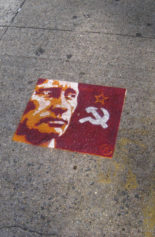The United States and Russia continued the public relations war over human rights Saturday, with the Russians releasing a blacklist of Americans banned from entering their country in retaliation for the U.S. decision to publish the infamous “Magnitsky list.”
According to the Russian Foreign Ministry, its list of 18 American officials are those “implicated in human rights violations.” The statement says the list “primarily includes those who are implicated in legalization of torture and perpetual detentions in Guantanamo prison, to the arrests and kidnapping of Russian citizens.”
In its statement, the ministry also called the “Magnitsky list” an “unfriendly step” and said that “a powerful blow has been dealt to bilateral relations and mutual trust.”
“The war of lists isn’t our choice, but we don’t have the right to not answer such open blackmail,” ministry spokesman Aleksandr Lukashevich said in a televised statement. “It’s time for Washington politicians to finally understand that there are no prospects in building relations with a country like Russia with the spirit of mentoring and undisguised dictating.”
Aleksei Pushkov, the head of the State Duma’s Foreign Affairs Committee, said the Russian move was appropriate.
“We do not want to turn this into a political war, but we will act symmetrically,” he told the Interfax news agency.
The Russian list names four people allegedly involved in Guantanamo: David Addington, who served as chief of staff under former Vice President Dick Cheney; John Yoo, a former U.S. Justice Department official who wrote legal memos authorizing harsh interrogation techniques; and two former commanders of the Guantanamo Bay Detention Center — retired Maj. Gen. Geoffrey Miller and Adm. Jeffrey Harbeson.
There are also 14 others charged with violating the rights of Russian citizens abroad, including Viktor Bout, the Russian arms merchant jailed in 2012, and Konstantin Yaroshenko, jailed for drug trafficking in 2011. The list also includes U.S. District Judge Jed Rakoff and several prosecutors from his district in the state of New York.
For its part, the U.S. on April 12 imposed visa bans and asset freezes on 18 people, many of them Russian, who allegedly committed human rights abuses. Sixteen were cited for their role in the case of Sergei Magnitsky, the Moscow lawyer and whistle-blower.
The matter started in December when a new Russia trade bill was approved by Congress that included a controversial measure punishing Russians accused of human rights abuses. While the human rights provision won’t have much affect on the trade measure, it was largely intended to embarrass Russia — even in its name, the Magnitsky Law, named after Magnitsky. The Russian lawyer died in a Moscow prison in 2009 after exposing an alleged $230 million tax fraud by Russian police and officials.
An enraged Russia responded to the congressional vote by accusing the U.S. of a”vindictive desire” to damage Russia’s world standing. “Apparently, Washington has forgotten what year this is and still thinks the Cold War is going on,” the Russian Foreign Ministry said on Twitter. It said that the move would “adversely affect the prospects of bilateral cooperation” between the two nations.
But in one of its final tweets in last night’s Twitter onslaught, the Russian Foreign Ministry said, “It is perplexing and preposterous to hear human rights complaints from the U.S., where torture and kidnapping are legal in the 21st century.”


